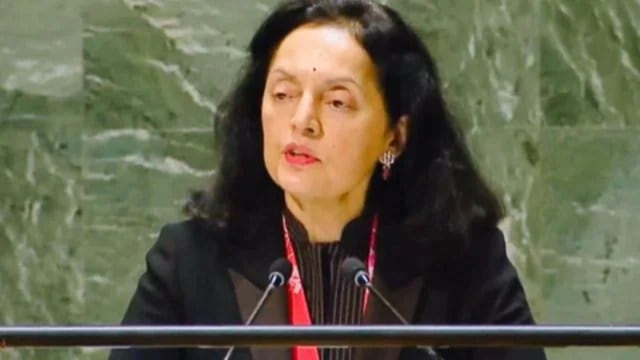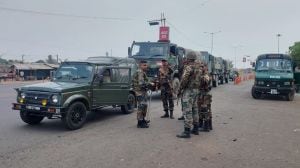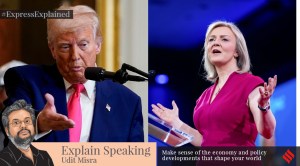‘Global south has no voice in UN Security Council, 5 nations overwrite will of 188 others’
Former Permanent Representative of India to UN, Ruchira Kamboj, delivered a lecture at Rashtriya Raksha University.
 Retired IFS officer Ruchira Kamboj delivered a key-note at Rashtriya Raksha University in Gandhinagar. (Express File)
Retired IFS officer Ruchira Kamboj delivered a key-note at Rashtriya Raksha University in Gandhinagar. (Express File) Citing inclusion as a challenge to multilateralism in the world today, former Permanent Representative of India to the United Nations (UN) and retired IFS officer Ruchira Kamboj on Monday said that the global south has no voice in the UN Security Council and that five countries overwrite the will of 188 countries.
Kamboj said this while delivering a key-note lecture on ‘Multilateralism in the 21st Century: Adapting to Emerging Challenges’ at Rashtriya Raksha University in Gandhinagar.
On the issue of inclusion, Kamboj said, “Do you think the composition of the UN Security Council is inclusive? Clearly not. Where is the global south? 85% of the world’s population and the global south does not find a place in the UN Security Council. The UN was formed in 1945. 51 ccountries. Today, what is the population of the UN? 193 countries. That is four-fold increase. But the Security Council remains frozen in time. It is not contemporary; it is not serving the purpose for which it was created…the council has not adapted to the times… India, along with three more countries, which is called the G4, has been spearheading the charge for many decades actually.”
“It is very very important to bring the global south on the table. And you might ask me why and my response to that would be we need a greater diversity of voices on the table; if decision-making is to be more legitimate, more representative and more effective,” she added.
Kamboj further said, “There is a whole process in the UN system, but that discussion has been driven by geo-political rivalries. There are some nay-sayers and frankly the issue is very very sensitive. And if you ask me why, the reason would be that potentially if there is a change in permanent membership and new members do come on the table then it will upset the balance of power. The balance of power, which was very cleverly and clearly established in 1945 by a group of countries. It was built for and by mostly Western countries. And if there is an expansion, that will upset that very careful balance of power. So, nobody wants it. Its an exclusive club. Some people have unequal rights. Five countries overwrite the will of 188 countries…. No members of the global south is really speaking in the UN system which ensures that the global south is kept out of the decision-making processes. How does that work?”
She, however, asked people to remain optimistic on the issue since a process on bringing reforms at the UN is under discussion.
During her speech, the retired IFS officer also mentioned certain factors in the backdrop of which the challenges to multilateralism need to be viewed like geo-political power rivalry, technology, digital divide, climate crisis and economic tension.
On digital divide, Kamboj said, “Do you know that about 30% of people of this planet, are offline?… Can you imagine that? They are stuck in a slower and a smaller world. No Tiktok, no Zoom, none of the AI perks that you and I enjoy. So, the digital divide which is a direct consequence of the world of technology that we live in is very real.”
She also highlighted a trend of surging nationalism in the world, with more and more leaders questioning global cooperation.
“Nationalism is on the rise. Last year, 2024, was a monster year. It was a monster year for elections. About 60 countries went to the elections. Some came out with fresh nationalist leaders and some retained nationalist leaders in the saddles of power. So, nationalism has surged in 2024, I would say across Europe and the Americas, with more and more leaders questioning global cooperation,” Kamboj said.
On economic tension being an important factor for multilateralism, Kamboj referred to the reciprocal tariffs imposed by the Donald Trump administration of the United States.
“…you have just heard of the reciprocal tarrifs that President Trump of United States has imposed. Some countries have responded, some have not. But certainly, China has also announced that it will respond with tarrifs of its own. So, where are we in the middle of a potential trade war? None of us can predict the end game of this. But, for sure, we are definitely stirring up a lot chaos.”
Kamboj said that a lot of good work is being done in the world in various fields like children’s education, health, food security etc., but multilateralism has not been able to solve the world’s problems today as far as peace and security are concerned.
Kamboj said that since multilateralism has not been functioning optimally, the world is seeing rise in more and more issue-specific alliances and regional formations. “I was reading a recent report that says there are today at least 20 active issue-specific alliances,” she said. She, however, added that the regional formations and multilateralism should be seen not as “either or”, but as “complementary”. “It is not one at the expense of the other, it is more a complimentarity.”
“If I were to give an analogy, the two (systems) are locked in a tense uneven partnership. Neither will dominate, neither can collapse…both of them will sort of muddle through delivering enough to limp along, but not enough perhaps, to resolve tarrifs, climate or resolve the distrust fully,” Kamboj concluded.
Must Read



Buzzing Now



Apr 12: Latest News
- 01
- 02
- 03
- 04
- 05



















